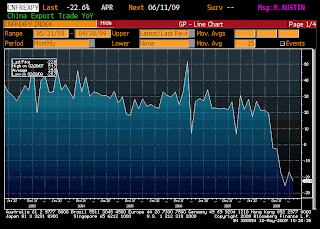There are a couple of things which have caught my eye this morning.
Firstly, the Chinese data released last night saw exports -22.6 YoY vs the March (uptick) of -17%. I have aired my doubts about Chinese recovery before (see May 7) given the export driven nature of the economy. The Bulls will talk of Fixed Asset Investment being up, which it was, but this is due to the stimulus programme, which along with the significant YoY price falls in commodities, will have led to the big increase in commodity imports YoY. As mentioned before, it’s the government banks which are extending the credit for these stimulus package projects and outside of this, loan demand is still poor.
 The other thing is not so time relevant but something I’ve been trying to work out for a long time and was just brought to my mind again in the last 24 hours. Namely, the inflation-deflation polemic, if that’s not too strong a word. I guess net net, I’ve been a buyer of the inflation argument and thinking property, commodities etc should be good longer term investments. The basic idea being that with all this money printing, the monetary base increases, which increases the money supply which will affect the price level. Throw in the simulative measures of the government, or even if they’re not so successful, the idea that we will recover naturally, then the increase in aggregate demand will exacerbate the increase in the price level. Bottom line, lock in a good rate and I’m pretty happy to look at buying a property which could be home for 10-15 years.
The other thing is not so time relevant but something I’ve been trying to work out for a long time and was just brought to my mind again in the last 24 hours. Namely, the inflation-deflation polemic, if that’s not too strong a word. I guess net net, I’ve been a buyer of the inflation argument and thinking property, commodities etc should be good longer term investments. The basic idea being that with all this money printing, the monetary base increases, which increases the money supply which will affect the price level. Throw in the simulative measures of the government, or even if they’re not so successful, the idea that we will recover naturally, then the increase in aggregate demand will exacerbate the increase in the price level. Bottom line, lock in a good rate and I’m pretty happy to look at buying a property which could be home for 10-15 years.This is a pretty neat argument and an easy one to buy into. But I read a piece here which referenced another piece I’d previously read here and they brought back some of my old fears and poked a few holes in the convenient argument above. Going back to ECON 101 for a sec…so you increase the monetary base, this doesn’t necessarily increase the money supply (M2), you also need to factor in the money multiplier. So while total reserves have gone up a lot, so too have excess reserves, which means that the multiplier hasn’t…it’s gone down. There is an inverse relationship here which is pretty logical…as excess reserves increase, the amount you can lend out, spend etc decreases, so does the multiplier. Nevertheless, while the multiplier has fallen, M2 has still grown 14%+ in the past 6 months. But an increase in M2 doesn’t necessarily translate into an increase in GDP. For that to happen, the velocity of money has to remain constant (or it could go up). Now V has a historical direct relationship with financial innovation and leverage, neither of which are in abundance at the moment, or likely to be any time soon. Long term average of V is 1.67 and it usually falls below this in periods of deleveraging and unsuccessful financial innovation. So we’ll very likely see a decrease in V and this makes sense as people spend less, save more. So while the monetary base may have increased, you need credit expansion too for this to become inflationary, and this hasn’t happened. Similarly, while M2 may increase, it does not necessarily follow that it will be translated into a higher GDP as Velocity will likely fall.
Lastly is the issue of whether budget deficits are inflationary, history suggests no, as they weaken the private economy and this hinders investment and the following recovery. US government debt/GDP is predicted to jump to 70% odd over the next four years. Comparing this to the Japanese experience from 1988-2008 where debt/GDP surged from 50 to 170%, the prognosis is not good; Japan is still mired in a serious recession. The Japanese experience echoes that of the US from 1929-1941.
Lastly, and I’ve come across this stat quite a few times, during deflationary periods (if this is where we’re headed) the risk premium on equities has actually been negative. Between 1988-2008, the return on Japanese government bonds exceeded that on equities by 8.4%. I’ve nicked this table here from the Hoisington article, but they’ve taken it from BEA & BLS amongst others so I’m ok with doing that. There’s more detail in the articles which are a v good read.





No comments:
Post a Comment